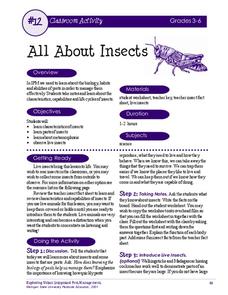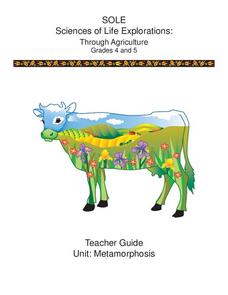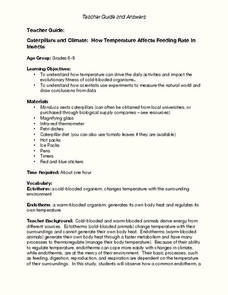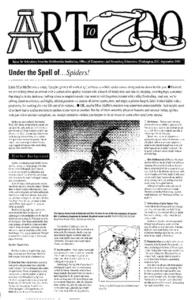Intel
Insects: The Good, The Bad, The Ugly
What would the world be like with no insects? Ponder this question using a research-based STEM unit that encourages scholars to investigate insects from both a beneficial and hazardous perspective. They learn about insect behaviors,...
Curated OER
Darwin’s Bees
What do you call a bee born in May? A maybe! This first instructional activity in a series of four begins with a starter activity to get scholars thinking about the topic. Then a circus, or circuit of seven activities,...
Curated OER
Insect Anatomy
A wonderful lesson plan on the many benefits of having spiders and bugs around us. Learners discover how important these bugs are to our ecosystem. The lesson helps young biologists see the differences between spiders and caterpillars,...
University of Minnesota
Manduca sexta: Caterpillar Dissection
Caterpillars have an amazing, yet tough job to perform in their short lives — eat much, avoid predators, and try not to let all those comments about being the unattractive stage of the life cycle get to them. How do they handle it all?...
American Museum of Natural History
Wonderful World of Wasps
Shockingly, wasps sometimes challenge lions as the king of predators! Learners explore the life of a wasp in an interactive online lesson. They read about the characteristics of wasps and then complete activities to learn about their lives.
Biology Junction
World of Insects: Characteristics, Orders, and Collecting
Every bug is an insect, but not all insects are bugs. A presentation lists the characteristics of insects, describes their body parts, and explains metamorphosis. It also details every order and includes photographs and multiple facts...
Cornell University
Insect IPM
Find out the characteristics that makes a bug an insect with a workbook designed to inform scholars about the crawly creatures that live around us. Scholars complete an ant-themed word search, answer questions using a solution key,...
Michigan State University
All About Insects
Insects are the focus of an activity that looks deep into the anatomy and metamorphosis of everyday bugs. Two worksheets reinforce knowledge obtained through a teacher-guided grand conversation and insect observation.
Cornell University
Metamorphosis
Looking for an insect unit that addresses multiple skill strategies? Young entomologists explore multiple life cycles of insects that go through metamorphosis. The brainteasers and mobile activity spark learner interest before guiding...
Cornell University
Let’s Raise Lacewings
Young entomologists explored beneficial insects and how they help control pests in the first lesson of the series. Now class members take a close look at the lacewing, which is a beneficial insect.
Cornell University
Insect Anatomy
Young entomologists discover insect anatomy in a very detailed unit plan. Offering background information for teachers about various insects, class members explore the differences between bugs and insects—and yes, there are many...
Curated OER
Caterpillars and Climate: How Temperature Affects Feeding Rate In Insects
Do you eat more when you are hot or when you are cold? Young scientists observe the eating pace of two caterpillars at different temperatures. The differences in endotherm and ecotherm animals' ability to adjust to temperature change...
Ask a Biologist
The Many Faces of Ants
Though they be but little, they are fierce! Young biologists read about eight different species of ants, and discover how the anatomy of their heads can explain the way they live and what they eat.
Science Friday
Ugh, a Bug!
Young entomologists familiarize themselves with the physical characteristics of insects. Composed of two activities, each lesson involves your scientists tapping into their prior knowledge of bugs and making observations of real live...
McGraw Hill
Arthropods
Are spiders related to crabs? Study the order of arthropods with a reading selection about animal diversity. It provides details about each class within the order, as well as vivid pictures and explanatory charts.
Curated OER
Learning to Resist: Watercolor
Consider wax resist drawings as a way to bridge art and science. Learners view, discuss, and practice drawing insects or animals using waxy crayons. They pay attention to the creature's features as they create images with watercolor and...
Curated OER
Invent an Insect
Explore biology by researching adaptation. First, learners research and define a list of insect vocabulary terms and discuss the benefits of each insect characteristic. They then utilize a worksheet to create their own insect and share...
Curated OER
Insect Anatomy
Break down insect anatomy with this worksheet! Class members diagram insect anatomy by drawing a line from the names of grasshopper body parts to the corresponding parts on an image of a grasshopper. The worksheet provides the word bank...
Curated OER
Insects
Introduce your unit on insects with this six-slide PowerPoint presentation. Characteristics of an insect are briefly discussed, including two informative diagrams. Tip: After showing this presentation, ask students to share what they...
Curated OER
I Wish I Were a Butterfly
Students inquire about biology by reading a children's book in class. In this insect lesson, students read the story "I Wish I Were a Butterfly" and identify the unique characteristics of butterflies and other insects. Students...
Curated OER
Those Busy, Buzz'n Worker Bees
Students research information on worker bees. In this insect lesson, students review the body parts of insects and how bees find flowers. They discuss compound and simple eyes and the life cycle of a worker bee.
Curated OER
Ant Farm
Students explore the value of insects in the natural world. For this insect lesson, students examine species of insects, collect and record data, and analyze the data.
Curated OER
Adopt An Insect
In this insect worksheet, learners choose a specific insect and complete a page with facts, diagrams and answers to questions. Students will need to research adaptations, defensive structures and scientific name.
Curated OER
Under the Spell of Spiders!
Students read about spider body parts, abilities, tendencies, and life cycles. In this Under the Spell of Spiders! lesson, students create mystery creatures that turn out to be spiders. Students catch and observe spiders and insects....

























